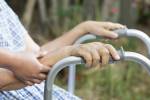Meals, housework, errands ways to help sick friends, family
You won't find Sick Person Avoidance Syndrome in medical textbooks. But, for well-intentioned friends and family who become paralyzed to inaction when trying to figure out how to help ill friends or family members, it's a very real condition.
It's not that we don't want to help out. Rather, it's just that we don't know what we should or shouldn't do, or whether what we'd like to do is the right thing. Or, we simply worry that our attempts to help might be taken as an intrusion into someone else's private affairs.
So, in the end, we do nothing at all.
It turns out, the Christmas holiday season can be a time when navigating this dynamic is especially tricky. Dr. James Sanchez of Comprehensive Cancer Centers of Nevada notes that the holiday season can cause confusion about the foods a cancer patient may eat, or raise questions from loved ones about "if they have to keep everybody away because of the possibility of infection."
"We get asked quite a number of questions like this around the holidays, because social gatherings occur much more frequently this time of year," Sanchez says.
We asked a few Southern Nevada medical professionals for some simple, down-to-earth, practical ways in which we can help sick or hospitalized loved ones. Here are their suggestions.
The problem
The question usually involves not only what to do but what to say, "because they never know what to say and they're afraid they're going to say the wrong thing," says Vicki Koceja, oncology palliative care director at St. Rose Dominican Hospitals.
Fortunately, says Minta Albietz, a registered nurse and chief nursing executive at Sunrise Hospital and Medical Center, "research has pretty much shown that saying and doing something is better than doing nothing," even in the case of a significant medical event.
A sentiment as simple and as unadorned as "I'm so sorry," Albietz says, "opens the door for whoever this person is to share (his or her) feelings."
And that, in turn, lays the foundation for a well-wisher to learn about ways in which he or she might help.
"I think the biggest problem is, people don't ask," says Dee McKay, director of case management at Valley Hospital Medical Center. And, when they do, she continues, it often takes the form of, " 'Call me if there's anything I can do.' Well, most people are not going to pick up the phone."
Food
A bowl of chicken soup or a casserole dropped off at the back door are traditional means of showing an ailing friend that somebody's thinking of him or her.
It's still a good one. Be it a bout of the flu or treatment for a significant health issue, few feel like cooking when they're under the weather. The problem comes when a friend feels unsure about what he or she should cook or what foods a friend may be permitted to eat.
"I get this question a lot," says Shelley Miles, a registered nurse at Comprehensive Cancer Centers of Nevada.
Friends "aren't sure what they can cook for (cancer) patients," she says. "So we spend a lot of time educating them about how chemotherapy affects the body."
In the case of cancer patients, there usually "aren't any restrictions of food," Miles says, and dietary needs boil down to "what people feel they can eat."
But, she adds, "it's important to ask the patient, too, because taste buds will change depending on what (cancer) treatment they're given. Some people don't like sweets, some people don't like savory. It's important to check with the patient before bringing something over."
But also be mindful of dietary restrictions a person may have. For example, Albietz notes that those with diabetes or heart conditions may not be able to eat specific kinds of foods, while someone recovering from a stroke "may not have the mechanical capacity to chew food correctly."
The best tack is simply to check with the person before bringing something over. Lacking either temporary or indefinite dietary restrictions, soups always are a good option, Albietz says, as are microwave-ready dinners in single-serving containers -- place one in the fridge for now and one in the freezer for later -- that can be prepared as needed.
If the ailing person also is the family cook, consider packing a few meals that can be prepared easily, Albietz adds. "If it's an adult who's sick, pick up some toaster pancakes or something so all Mom has to do is throw them into the toaster and she can go back to bed."
By the way, Koceja says, "don't tell them you're bringing something, because when you ask they'll say, 'Oh, no, that's OK.' Give them some direction: 'I'm going to bring some ice cream over later, if you feel like it. Later on, you might like it."
Similarly, Albietz says, "just say, 'I'm at the grocery store ... and I'm picking up some orange juice and Gatorade and I'm going to bring it over. Does anything else sound good to you?'
"Just assume you're going to bring things over, or they'll say, 'No, no, don't bring anything. You don't have to.' "
Sometimes, Albietz explains, people "have a hard time asking for help."
Around the house
The same thing goes for household chores. Someone who's laid low by the flu or recovering from surgery or being treated for a serious medical condition probably can't do, or won't feel like doing, routine things around the house.
Koceja suggests: Do the laundry, or clean the house, or wash dishes, or cut the grass. Change the burnt-out light bulb. Vacuum. Be particularly mindful of chores that require lifting, bending or stretching.
Similarly, the holiday season brings with it additional chores an ill or recovering person would appreciate having done, from addressing cards to putting up lights.
Meanwhile, when people are hospitalized, pick up their mail, keep an eye on their house and "make sure everything is OK" at their home, Albietz says. "Pick up trash cans, pick up papers, turn on lights inside and outside the house so that it looks like somebody is home.
"The other thing about hospitalized friends is really dear friends take care of their dogs without asking," she adds. "Or somebody can go into the house or adopt their pets for a week."
For hospitalized loved ones
Remember hygiene. Koceja notes, for instance, that a person whose immune system is compromised is susceptible to infection, so washing hands is important, whether at home with a flu-stricken friend or in a hospital setting.
That, by the way, also is why live flowers in the hospital rooms of cancer patients can be a problem, Koceja says. "We don't want those flowers in standing water because they can breed bacteria."
Albietz says: "It's nice to have, maybe, an arrangement of artificial flowers. They don't die, and nurses don't have to worry about spilling water and you don't have to worry about getting them home."
If balloons are your cheer-up choice, opt for Mylar, and not latex balloons, because some people have latex allergies, Albietz says.
Smokers should be particularly wary of visiting hospitalized friends, because the odor of smoke tends to stick to clothing, Albietz says. And avoid perfume or strong fragrances.
Meanwhile, the hospital-bound always will appreciate books, puzzles and other things to help pass the time.
Long-distance help
Pitching in for an ill loved one is difficult when he or she lives across the country. However, the Internet enables well-wishers to keep in touch in several ways.
For instance, Gretchen Papez, marketing director of Valley Hospital, has used the Take Them a Meal website (www.TakeThemAMeal.com) to organize long-distance volunteer meal-preparers. And Care Pages (www.CarePages.com) enables friends to follow updates about how someone is doing, Albietz says.
E-mail and text messages offer a means of keeping in touch and offering encouragement. Don't expect a return call, Papez says, but do expect to listen when a friend needs an ear.
Social networking sites provide a way to keep in touch, Albietz says, while Skype and other such services offer a chance to talk face to face with far-away loved ones.
Meanwhile, Albietz also suggests asking friends and family members who do live in the loved one's locale to, say, do an occasional grocery trip or stop in to check up on the loved one, while Papez says, gift cards to restaurants or gasoline cards that can be used for driving to doctor's appointments also will be appreciated.
All the rest
Transportation always is an issue for post-surgical patients, the injured and those being treated for medical conditions. Albietz suggests offering to play chauffeur for trips to the pharmacy, doctors' offices and places they can't drive to themselves.
Offer baby-sitting services to ailing friends with kids. McKay says taking the kids of ill, homebound or recuperating friends for an afternoon outing not only keeps them occupied but offers a friend a few hours of rest, nap time or quiet time.
Offer the gift of your company. "Get a deck of playing cards and play a hand of gin rummy," Albietz says. "You don't have to stay long. That's another thing: You don't want to wear them out. Go by and stay 30 minutes and say, 'OK, I've gotta go.' "
Be sensitive to how your friend is feeling. Sometimes, "you kind of have to outsmart them," Albietz says, while, other times, "you just have to really know your friend and know when to honor the 'No.' "
Contact reporter John Przybys at jprzybys@ reviewjournal.com or 702-383-0280.























